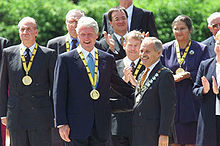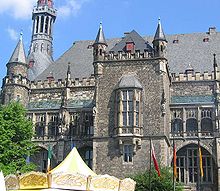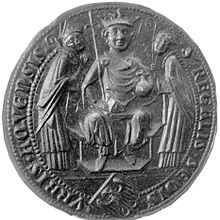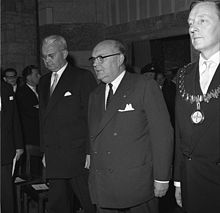- Charlemagne Prize
-
Charlemagne Prize 
The 2008 prize medal which was awarded to Angela MerkelAwarded for Distinguished service on behalf of European unification Presented by Society for the Conferring of the International Charlemagne Prize of Aachen Location Aachen, Germany First awarded 1950 Official website www.karlspreis.de  Bill Clinton, recipient in 2000, along with earlier recipients King Juan Carlos I of Spain, Václav Havel and Simone Veil
Bill Clinton, recipient in 2000, along with earlier recipients King Juan Carlos I of Spain, Václav Havel and Simone Veil
 Angela Merkel with the 2008 prize medal around her neck
Angela Merkel with the 2008 prize medal around her neck
 The city hall of Aachen
The city hall of Aachen
The Charlemagne Prize (German: Karlspreis; full name originally Internationaler Karlspreis der Stadt Aachen, International Charlemagne Prize of the City of Aachen, since 1988 Internationaler Karlspreis zu Aachen, International Charlemagne Prize of Aachen) is one of the most prestigious European prizes.[1] It has been awarded once a year since 1950 by the German city of Aachen to people who contributed to the ideals upon which it has been founded. It commemorates Charlemagne, ruler of the Frankish Empire and founder of what became the Holy Roman Empire, who resided and is buried at Aachen. Traditionally the award is given to the recipient on the Ascension holiday in a ceremony in the town hall of Aachen.
Contents
History
 The medieval city seal of Aachen on which the design of the prize medal is based
The medieval city seal of Aachen on which the design of the prize medal is based
On 19 December 1949, Kurt Pfeiffer presented to the reading group "Corona Legentium Aquensis", which he had founded, his proposals for the prize: "We have the honour of proposing annual presentation of an international prize for the most valuable contribution in the services of Western European understanding and work for the community, and in the services of humanity and world peace. This contribution may be in the field of literary, scientific, economic or political endeavour."
The sponsors of the prize, the City of Aachen, refer to Charlemagne as the "Founder of Western Culture", and assert that under his reign, the City of Aachen was once the spiritual and political centre of the whole of what is now western Europe.
The first Charlemagne Prize was awarded to Richard Count Coudenhove-Kalergi, the founder of the Pan-European Movement.
Following the presentation of the award to the Italian Prime Minister Alcide de Gasperi in 1952, the International Charlemagne Prize of the City of Aachen has repeatedly sent messages going far beyond Germany and promoting the "unity of Europe".
The award sponsors assert that the list of Charlemagne Prize winners reflects the history of the European process of unification. They continue that it has been awarded to the founding fathers of the United Europe such as de Gasperi, Schuman, Monnet and Adenauer, and to those who have embodied hope for integration such as Edward Heath, Konstantin Karamanlis, and His Majesty Juan Carlos I.
The sponsors promote that the Charlemagne Prize is not only an expression of gratitude for lasting services for the unity of Europe, but also an encouragement and an expression of hopes and expectations directed towards the future. They quote Kurt Pfeiffer: "the Charlemagne Prize reaches into the future, and at the same time it embodies an obligation - an obligation of the highest ethical value. It is directed at a voluntary union of the European peoples without constraint, so that in their new found strength they may defend the highest earthly goods - freedom, humanity and peace - and safeguard the future of their children and children's children."
In April 2008, the organisers of the Charlemagne Prize and the European Parliament jointly created a new European Charlemagne Youth Prize, which recognises contributions by young people towards the process of European integration.
Recipients of the Charlemagne Prize
- 1950 Richard Nikolaus Graf Coudenhove-Kalergi
- 1951 Hendrik Brugmans
- 1952 Alcide de Gasperi
- 1953 Jean Monnet
- 1954 Konrad Adenauer
- 1956 Sir Winston S. Churchill
- 1957 Paul Henri Spaak
- 1958 Robert Schuman
- 1959 George C. Marshall
- 1960 Joseph Bech
- 1961 Walter Hallstein
- 1963 Edward Heath
- 1964 Antonio Segni
- 1966 Jens Otto Krag
- 1967 Joseph Luns
- 1969 The European Commission
- 1970 François Seydoux de Clausonne
- 1972 Roy Jenkins
- 1973 Don Salvador de Madariaga
- 1976 Leo Tindemans
- 1977 Walter Scheel
- 1978 Konstantinos Karamanlis
- 1979 Emilio Colombo
- 1981 Simone Veil
- 1982 King Juan Carlos of Spain
- 1984 Karl Carstens
- 1986 The People of Luxembourg
- 1987 Henry A. Kissinger
- 1988 François Mitterrand and Helmut Kohl
- 1989 Frère Roger (of the Taizé Community)
- 1990 Gyula Horn
- 1991 Václav Havel
- 1992 Jacques Delors
- 1993 Felipe González
- 1994 Gro Harlem Brundtland
- 1995 Franz Vranitzky
- 1996 Queen Beatrix of the Netherlands
- 1997 Roman Herzog
- 1998 Bronisław Geremek
- 1999 Tony Blair
- 2000 Bill Clinton
- 2001 György Konrád
- 2002 The Euro
- 2003 Valéry Giscard d'Estaing
- 2004 Pat Cox
- 2004 Extraordinary prize: Pope John Paul II
- 2005 Carlo Azeglio Ciampi
- 2006 Jean-Claude Juncker
- 2007 Javier Solana
- 2008 Angela Merkel
- 2009 Andrea Riccardi
- 2010 Donald Tusk [2]
- 2011 Jean-Claude Trichet
See also
- Charlemagne
- European integration
- Leipzig Human Rights Award, originally called the "Alternative Charlemagne Award", formed in opposition to Clinton's recognition with the award
References
- ^ Spiegel.de (German)
- ^ dw-world (German)
External links
Categories:- Charlemagne Prize
- Awards established in 1949
- German awards
- Peace awards
- Humanitarian and service awards
Wikimedia Foundation. 2010.

